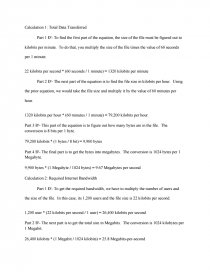Calculating Bandwidth
Essay by review • June 2, 2011 • Study Guide • 355 Words (2 Pages) • 967 Views
Calculation 1: Total Data Transferred
Part 1 Ð'- To find the first part of the equation, the size of the file must be figured out to kilobits per minute. To do that, you multiply the size of the file times the value of 60 seconds per 1 minute.
22 kilobits per second * (60 seconds / 1 minute) = 1320 kilobits per minute
Part 2 Ð'- The next part of the equation is to find the file size in kilobits per hour. Using the prior equation, we would take the file size and multiply it by the value of 60 minutes per hour.
1320 kilobits per hour * (60 minutes / 1 minute) = 79,200 kilobits per hour
Part 3 Ð'- This part of the equation is to figure out how many bytes are in the file. The conversion is 8 bits per 1 byte.
79,200 kilobits * (1 bytes / 8 bit) = 9,900 bytes
Part 4 Ð'- The final part is to get the bytes into megabytes. The conversion is 1024 bytes per 1 Megabyte.
9,900 bytes * (1 Megabyte / 1024 bytes) = 9.67 Megabytes per second
Calculation 2: Required Internet Bandwidth
Part 1 Ð'- To get the required bandwidth, we have to multiply the number of users and the size of the file. In this case, its 1,200 users and the file size is 22 kilobits per second.
1,200 user * (22 kilobits per second / 1 user) = 26,400 kilobits per second
Part 2 Ð'- The next part is to get the total size in Megabits. The conversion is 1024 kilobytes per 1 Megabit.
26,400 kilobits * (1 Megabit / 1024 kilobits) = 25.8 Megabits-per-second
Part 3 Ð'- The last part is to figure out if our line can handle the bandwidth expectations of the expected traffic for the event.
45 Megabits per second Ð'- 25.8 Megabits per second = 19.2 Megabits per second to spare.
The answer is yes. We would have enough to spare for the live event. When the total amount of the live events bandwidth is less than what our server
...
...

